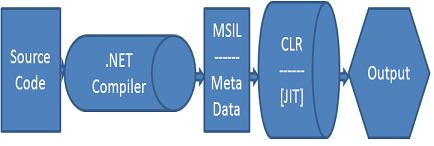Execution process for managed code
Managed execution process includes the following steps:
Choosing the right compiler
The .NET Framework is an advanced execution environment that facilitates the development of applications using multiple programming languages. It incorporates a robust runtime environment capable of accommodating a diverse range of data types and comprehensive language features. To fully capitalize on the extensive capabilities offered by the common language runtime (CLR), it is advisable to employ one or more language compilers specifically designed to target the CLR.
By utilizing language compilers such as VB.NET or C#, developers can take advantage of the rich functionality provided by the common language runtime. These compilers translate source code written in their respective languages into an intermediate representation known as the Common Intermediate Language (CIL). The CLR is responsible for executing this CIL code, ensuring efficient memory management, robust exception handling, and type safety.
Adopting a language compiler tailored for the common language runtime enables developers to utilize the full potential of the runtime's features and optimizations. Additionally, it grants access to an extensive set of pre-existing libraries and frameworks within the vast .NET ecosystem. Using these resources simplifies application development, promotes code reusability, and enhances overall productivity.
Compiling the code to MSIL
In contrast to traditional source code compilation into machine-level code, the .NET language compilers adopt a different approach by translating the source code into Microsoft Intermediate Language (MSIL). This unique compilation process promotes language interoperability, as it allows applications developed in various programming languages to be seamlessly translated into a standardized intermediate language representation. Regardless of the language used, the resulting code is always in the form of Microsoft Intermediate Language.
During the compilation phase, the language compilers generate metadata that encompasses vital information about the program, including its dependencies, versions, and other descriptive details. This metadata serves as a valuable resource for the runtime environment, enabling it to effectively manage the execution and deployment of the application. By incorporating comprehensive metadata, the .NET Framework facilitates the resolution of dependencies, version compatibility, and other critical aspects during the runtime execution of the application.
Compiling MSIL to native code
Prior to program execution, the Just-In-Time (JIT) compiler takes on the responsibility of translating the Microsoft Intermediate Language (MSIL) into native code, which is then stored in a designated memory buffer. This JIT compilation process serves multiple purposes, including the conversion of MSIL to platform-specific machine code and the verification of type safety within the code.
Type safety is a critical aspect of the JIT compilation process, as it guarantees that objects are consistently accessed in a compatible manner, mitigating the risk of type-related errors during runtime. By enforcing type safety, the JIT compiler enhances the overall reliability and stability of the application.
It's important to note that the compiled native code generated by the JIT compiler is stored solely in memory and is not persisted to any permanent storage medium. Consequently, each time the application is executed, the JIT compilation process is repeated, ensuring that the most up-to-date native code is available for execution. This dynamic nature of JIT compilation allows for efficient adaptation to runtime changes and updates within the application.
Excecution of Code
Once the Intermediate Language (IL) code has been successfully translated into native code, it is handed over to the .NET runtime manager for execution. The .NET runtime manager plays a key role in executing the code and providing a comprehensive set of services to ensure the efficient and secure operation of managed code.
During the execution phase, managed code benefits from various essential services offered by the .NET runtime manager. These services include garbage collection, which automatically manages memory allocation and deallocation, ensuring efficient memory usage and preventing memory leaks. Additionally, the runtime manager provides robust security features to safeguard the execution environment and protect against malicious code.
Interoperability with unmanaged code is another key aspect facilitated by the .NET runtime manager. It enables seamless integration and communication between managed and unmanaged code, allowing developers to use existing code assets and libraries. Moreover, the runtime manager offers cross-language debugging support, enabling developers to debug applications written in different programming languages within a unified debugging environment.
The .NET runtime manager also enhances deployment and versioning support, simplifying the deployment and maintenance of applications by managing dependencies, resolving version conflicts, and facilitating seamless updates.

Conclusion
The .NET Framework serves as a versatile multilanguage execution environment, underpinned by the powerful common language runtime. By selecting and utilizing language compilers that specifically target the runtime, developers can fully exploit the comprehensive features and benefits offered by the CLR, empowering them to build robust and efficient applications with ease.